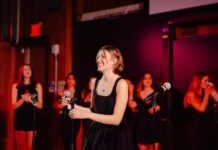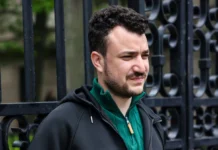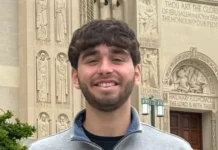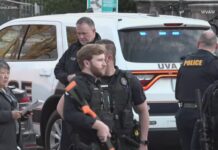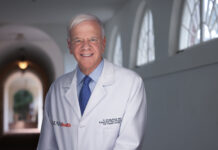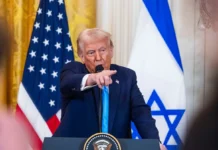On Wednesday, the University of Virginia hosted a “Whose Freedom, Whose Speech?” event to address the increasingly frequent problem of free speech on college campuses. The event was sponsored by PEN America, and featured speakers from various backgrounds to raise awareness of these challenges and propose solutions. WUVA News attended the event in McLeod Hall.
President Teresa Sullivan was present for the Wednesday forum, and introduced the moderator for the panel, Professor Roger Worthington from the University of Maryland.
According to Worthington, the panel was organized with the intentions to “explore [the] most challenging issues on college campuses in America” including “diversity, inclusion and free speech.”
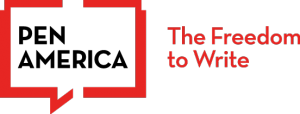
He also added that it was significant to discuss the free speech issue in the university setting because: “College campuses are soft targets, a place where demonstrators can do their bidding on the basis of first amendment.”
The first panelist to speak was Suzanne Nossel, a member of PEN. As a representative of an organization that deals with these debates of free speech often, Nossel was asked to summarize her findings on the various college campuses she visited and what controversies she witnessed in the past.
Nossel explained that each case is unique to the school and issue at hand: “I’ve gone to the sites, and each one looks a little different.”
She continued to describe how similar issues surrounding conservative free speech at University of California-Berkeley and Middleburg College felt different. She stated that at UC-Berkeley, “conservative students felt out of place and unprotected.” At Middlebury, “violent protests occurred when conservative speakers came.” Nossel concluded that in general, controversies tend to center around issues of race and free speech.
Worthington then asked the panelists: “By punishing hateful speech, are you pushing these feelings away and making them more dangerous? And can that hateful speech cause hateful actions?”
Jelani Cobb, a New Yorker contributor and Director of The Ira A. Lipman Center for Journalism and Civil and Human Rights, responded.
Cobb claimed that absolutely yes, the allowance of hateful speech can lead to further hateful action.
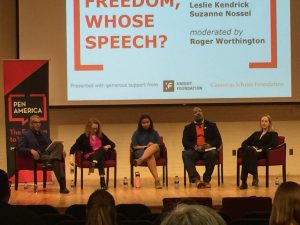
“We need to figure out how to use democratic principles applying to democratic ends. Nobody was surprised with what happened at UVa in August if you know the history of this country. Our country feels that if they impair your ideas of free hate speech and racism, then that takes away from democracy. However, ideology of slavery, racism, and hate speech are the exact things that go against democracy.”
Cobb also provided a counterexample. “Germany does not protect speech that claims the Holocaust was not real. Why should we protect speech that claims racism is okay?”
The next question Worthington asked was directed towards Leslie Kendrick, Vice Dean and Professor of Law at University of Virginia School of Law. Worthington wondered if there was any type of speech that is not protected, especially on college campuses.
Kendrick’s short answer was yes, however, she made important following distinctions.
“The rules for public and private are very different,” Kendrick stated. “Public institutions are instruments of the state. Private institutions can fire someone or get rid of someone because of their actions without violating free speech. Public institutions have more obligations under [the] First amendment.”
Kendrick continued that: “There are cases where free speech is not allowed, such as direct threats, vandalism, and other terms. Education cannot be impinged upon by the creation of hostile environment caused by free speech.”
The UVA Law Vice Dean and Professor nevertheless highlighted that even with these cases, the United States still possesses one of the most protective free speech regimes in the world.
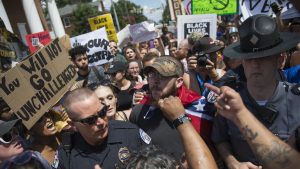
Alexis Gravely, a third year student at UVa, added that “some free speech is not free speech, it is hate speech.”
Gravely was strong in her opinion that was based upon what she heard from the panelists. College campuses, according to the student, are not places for what occurred at UVa in August.







